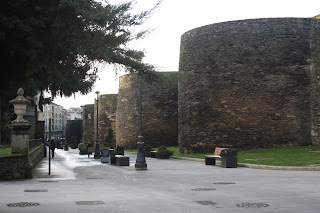Roman vs. Celt
This weekend in Lugo they're celebrating Arde Lvcvs. It's one of those festivals where people dress up according to a historical period. In Lugo the most important historical period was the Roman, when the Romans founded the city by first building a castrum, to defend themselves against the surrounding Celts. From that military fort the city grew and became one of the most important cities of Roman-occupied Hispania. Lucus Augusti
had a wall protecting it built in the third century. That wall, though modified and reconstructed in areas, still exists. In fact, Lugo is the only city in the world to still have a complete wall built by the Romans surrounding it. That is one of the reasons it was declared a World Heritage Site in the year 2000. Unfortunately, little else remains from those times. Most of it is in the provincial museum, which we visited in January.
The declaration of the wall as a Heritage Site, though, prompted people to start a celebration of Roman and Celtic life as it must have been. So Arde Lvcvs was begun and continues, with around half a million visitors during the weekend it is staged. There are military camps where people live as we think they lived two thousand years ago. There's a Celtic wedding ritual. It's supposed to be valid for a year, at the end of which the wife decides if she wants to renew. If the marriage is renewed for seven years, then it becomes for life (that's not such a bad idea). There is a market where "Roman" and "Celtic" artisan work is sold and where there are kid's workshops and musicians and other entertainment. There is a Roman circus set up with chariot races. There is a feast where people can eat for a fee typical Roman and Celtic dishes (I don't think they have garum, though). And there are all sorts of military parades and even mock fights between the defenders and the invaders. Yes, there are also gladiator fights. It's another way to remind people of their past and it's a fun way to see history.
Lots of cities and towns have historical festivals. The oldest is the Festa da Istoria in Ribadavia, where they celebrate medieval times when the Judaic community formed an important part of the town's social structure before their expulsion. Then there are the typical medieval fairs where people dress up as people from the past and there are all kinds of entertainment and stands to buy all manner of things, from food to soap. People are growing more aware of their past and acknowledging it. Once upon a time (forty years ago or so) it was perfectly legitimate to pull stones from the ruins of a castle to build your house. Now, the ruins are protected and people travel to visit and find out about the history of the area. It's good we've learned to protect our past. Now we just have to learn from it.
had a wall protecting it built in the third century. That wall, though modified and reconstructed in areas, still exists. In fact, Lugo is the only city in the world to still have a complete wall built by the Romans surrounding it. That is one of the reasons it was declared a World Heritage Site in the year 2000. Unfortunately, little else remains from those times. Most of it is in the provincial museum, which we visited in January.
The declaration of the wall as a Heritage Site, though, prompted people to start a celebration of Roman and Celtic life as it must have been. So Arde Lvcvs was begun and continues, with around half a million visitors during the weekend it is staged. There are military camps where people live as we think they lived two thousand years ago. There's a Celtic wedding ritual. It's supposed to be valid for a year, at the end of which the wife decides if she wants to renew. If the marriage is renewed for seven years, then it becomes for life (that's not such a bad idea). There is a market where "Roman" and "Celtic" artisan work is sold and where there are kid's workshops and musicians and other entertainment. There is a Roman circus set up with chariot races. There is a feast where people can eat for a fee typical Roman and Celtic dishes (I don't think they have garum, though). And there are all sorts of military parades and even mock fights between the defenders and the invaders. Yes, there are also gladiator fights. It's another way to remind people of their past and it's a fun way to see history.
Lots of cities and towns have historical festivals. The oldest is the Festa da Istoria in Ribadavia, where they celebrate medieval times when the Judaic community formed an important part of the town's social structure before their expulsion. Then there are the typical medieval fairs where people dress up as people from the past and there are all kinds of entertainment and stands to buy all manner of things, from food to soap. People are growing more aware of their past and acknowledging it. Once upon a time (forty years ago or so) it was perfectly legitimate to pull stones from the ruins of a castle to build your house. Now, the ruins are protected and people travel to visit and find out about the history of the area. It's good we've learned to protect our past. Now we just have to learn from it.




Comments
Post a Comment